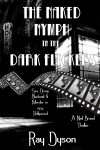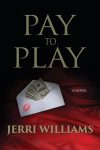

November 28 – December 4: “How do you make more time for writing?”
 Do you stop taking care of the house and the yard? Drop friends? Abandon your family? This week ITW Members Debbie De Louise, Gayle Trent, Mary Miley, Ronie Kendig, Phyllis Smallman, Jerri Williams and Ray Dyson discuss how writers can make more time for writing.
Do you stop taking care of the house and the yard? Drop friends? Abandon your family? This week ITW Members Debbie De Louise, Gayle Trent, Mary Miley, Ronie Kendig, Phyllis Smallman, Jerri Williams and Ray Dyson discuss how writers can make more time for writing.
~~~~~
 Mary Miley, historian and author of the Roaring Twenties mystery series, began her fiction career with The Impersonator, winning the Mystery Writers of America Best First Crime Novel award. A graduate of William and Mary, she worked at Colonial Williamsburg and taught history at Virginia Commonwealth University for many years. For getaways, she retreats to her Virginia winery where everything she does would have been illegal during the Prohibition era.
Mary Miley, historian and author of the Roaring Twenties mystery series, began her fiction career with The Impersonator, winning the Mystery Writers of America Best First Crime Novel award. A graduate of William and Mary, she worked at Colonial Williamsburg and taught history at Virginia Commonwealth University for many years. For getaways, she retreats to her Virginia winery where everything she does would have been illegal during the Prohibition era.
 Ray Dyson first took up eating in Evansville, IN, just long enough ago that, not only is the house he was born in no longer there, neither is the street. He attended The Ohio State University School of Journalism and spent several years as a newspaperman, covering crime and sports. He is a former sports editor and sports columnist, and now lives in Mansfield, OH, with his wife, Pamela, where he works as a freelance journalist. He has a particular interest in American history (especially the Civil War), the American West, and the American cinema. Dyson is the author of three other books: a baseball story, Smokey Joe; a Western novel, Bannon: The Scavenger Breed, and his first Neil Brand crime story, set in Hollywood in 1931, The Ice Cream Blonde (Black Opal Books 2016).
Ray Dyson first took up eating in Evansville, IN, just long enough ago that, not only is the house he was born in no longer there, neither is the street. He attended The Ohio State University School of Journalism and spent several years as a newspaperman, covering crime and sports. He is a former sports editor and sports columnist, and now lives in Mansfield, OH, with his wife, Pamela, where he works as a freelance journalist. He has a particular interest in American history (especially the Civil War), the American West, and the American cinema. Dyson is the author of three other books: a baseball story, Smokey Joe; a Western novel, Bannon: The Scavenger Breed, and his first Neil Brand crime story, set in Hollywood in 1931, The Ice Cream Blonde (Black Opal Books 2016).
 Debbie De Louise is a reference librarian at a public library on Long Island and has been involved with books and writing for over thirty years. She is a member of the Cat Writer’s Association, Sisters-in-Crime, and International Thriller Writers. She received the Lawrence C. Lobaugh, Jr. Memorial Award in Journalism for her work as Features Editor on the Long Island University/C. W. Post student newspaper, The Pioneer. More recently, Debbie received the Glamour Puss Award from Hartz Corporation for an article on cat grooming that appeared on Catster.com. She has published three novels, Cloudy Rainbow, A Stone’s Throw, and Between a Rock and a Hard Place, the second Cobble Cove mystery, that was published October, 2016 by Solstice Publishing as well as short stories in several anthologies. She is currently working on a psychological thriller and lives on Long Island with her husband, daughter, and two cats.
Debbie De Louise is a reference librarian at a public library on Long Island and has been involved with books and writing for over thirty years. She is a member of the Cat Writer’s Association, Sisters-in-Crime, and International Thriller Writers. She received the Lawrence C. Lobaugh, Jr. Memorial Award in Journalism for her work as Features Editor on the Long Island University/C. W. Post student newspaper, The Pioneer. More recently, Debbie received the Glamour Puss Award from Hartz Corporation for an article on cat grooming that appeared on Catster.com. She has published three novels, Cloudy Rainbow, A Stone’s Throw, and Between a Rock and a Hard Place, the second Cobble Cove mystery, that was published October, 2016 by Solstice Publishing as well as short stories in several anthologies. She is currently working on a psychological thriller and lives on Long Island with her husband, daughter, and two cats.
 Crime Writers of Canada award winning author, Phyllis Smallman, was short-listed for the Debut Dagger in the UK, and has been awarded both silver and gold medals by the Independent Publishers. She was a potter before turning to a life of crime. She lives on Salt Spring Island, British Columbia, where she golfs badly and writes madly. To learn more about Phyllis and to read excerpts from her Singer Brown and Sherri Travis book, please visit her website.
Crime Writers of Canada award winning author, Phyllis Smallman, was short-listed for the Debut Dagger in the UK, and has been awarded both silver and gold medals by the Independent Publishers. She was a potter before turning to a life of crime. She lives on Salt Spring Island, British Columbia, where she golfs badly and writes madly. To learn more about Phyllis and to read excerpts from her Singer Brown and Sherri Travis book, please visit her website.
 Ronie Kendig is an award-winning, bestselling author who grew up an Army brat. She’s penned over a dozen novels including The Quiet Professionals series and the Breed Apart series. She and her hubby have a full life with their children, their Maltese Menace, and a retired military working dog in Northern Virginia.
Ronie Kendig is an award-winning, bestselling author who grew up an Army brat. She’s penned over a dozen novels including The Quiet Professionals series and the Breed Apart series. She and her hubby have a full life with their children, their Maltese Menace, and a retired military working dog in Northern Virginia.
 Jerri Williams has been appearing on or in television, radio, online news sources and newspapers for over a decade discussing federal criminal investigations and public transit. She is currently working full-time as an author of crime fiction inspired by actual FBI cases. Her debut novel – Pay to Play – features a female FBI agent investigating corruption in the Philadelphia strip club industry.
Jerri Williams has been appearing on or in television, radio, online news sources and newspapers for over a decade discussing federal criminal investigations and public transit. She is currently working full-time as an author of crime fiction inspired by actual FBI cases. Her debut novel – Pay to Play – features a female FBI agent investigating corruption in the Philadelphia strip club industry.
 Gayle Trent (and pseudonym Amanda Lee) writes the Daphne Martin Cake Decorating series and the Embroidery Mystery series. The cake decorating series features a heroine who is starting her life over in Southwest Virginia after a nasty divorce. The Embroidery Mystery series features a heroine who recently moved to the Oregon coast to open an embroidery specialty shop.
Gayle Trent (and pseudonym Amanda Lee) writes the Daphne Martin Cake Decorating series and the Embroidery Mystery series. The cake decorating series features a heroine who is starting her life over in Southwest Virginia after a nasty divorce. The Embroidery Mystery series features a heroine who recently moved to the Oregon coast to open an embroidery specialty shop.
- LAST GIRL MISSING with K.L. Murphy - July 25, 2024
- CHILD OF DUST with Yigal Zur - July 25, 2024
- THE RAVENWOOD CONSPIRACY with Michael Siverling - July 19, 2024
